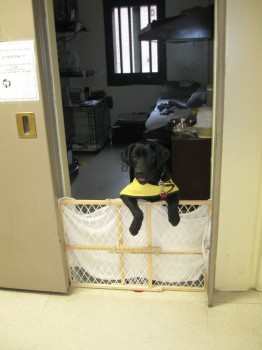 I just love it when several organizations partner together to produce really cool outcomes! The America’s VetDogs program partners prisons in Massachusetts and Maryland with the Guide Dog Foundation from New York to produce dogs trained to assist vets who were disabled in the service.
I just love it when several organizations partner together to produce really cool outcomes! The America’s VetDogs program partners prisons in Massachusetts and Maryland with the Guide Dog Foundation from New York to produce dogs trained to assist vets who were disabled in the service.
The Guide Dog Foundation breeds the dogs, usually Labrador Retrievers, and keeps them with their mamas until they reach about 8 – 9 weeks of age. Then the dogs are shipped to prison, where they are socialized and trained by inmates specially chosen for the honor. Veterans who are serving time are given special preference for the program.
An instructor from America’s VetDogs visits the prison about once a week to provide support and lesson plans for the ongoing training.
The puppies live in their handlers’ cells, but spend most of their days outside of the small cubicles going to classes, interacting with lots of people, and even eating with the inmates in the chow hall. All of this is designed to make sure the dogs don’t become institutionalized, but can function out in the real world. In addition, the puppies are sent home on the weekends with volunteers (prison staff or others) so they can spend time outside, getting used to traffic noise, children, and other animals.
After completing their prison training, the dogs go back to the Guide Dog Foundation for “finishing school”, getting them ready to be matched with a disabled veteran who needs an assistance dog. Interestingly, the dogs who go through the prison program can often advance through the finishing process in half the time it takes other dogs.
According to the VetDogs’ website, this program is a winner for all sides.
• America’s VetDogs wins because with the help of the inmate handlers, more assistance dogs can be placed with disabled veterans
• The disabled veteran wins as some of the most skilled service dogs come out of the prison puppy programs
• The inmate wins because he is able to give back to society, to make the life of a ‘brother’ or ‘sister’ veteran better, as well as learning how to train service dogs, a valuable life skill
• The Correctional facilities win because the puppies create a calmer climate and bring a sense of normalcy to the environment
• And the puppy wins because assistance dogs raised and trained in prison are placed more quickly and spend less time in America’s VetDogs’ kennel
What a great use of people who have very little else to do, putting them to work with dogs who have so much to do!
Until next time,
Good day, and good dog!
